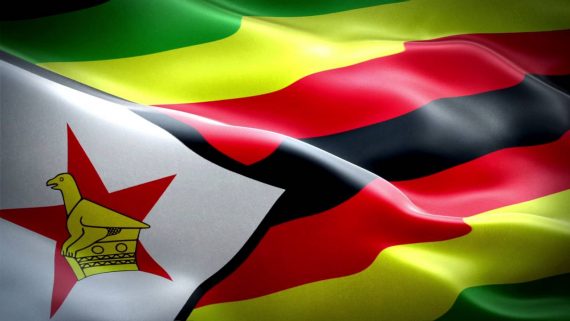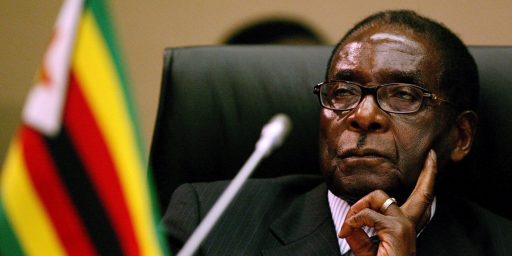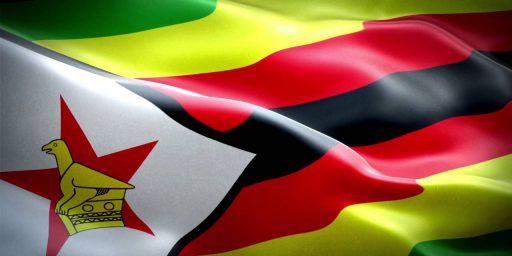Mugabe Removed As Head Of Zimbabwe’s Ruling Party, Threatened With Impeachment
After more than thirty years in power, Robert Mugabe is on his way out in Zimbabwe, but that doesn't mean things will improve.
Robert Mugabe, who has effectively ruled over the African nation of Zimbabwe since its creation in 1980, has apparently been removed as leader of the nation’s ruling party and given until Monday to resign his office or face impeachment:
HARARE, Zimbabwe — President Robert Mugabe’s own party voted to oust him as its leader on Sunday, a day after thousands of Zimbabweans took to the streets to celebrate his stunning fall from power after a military takeover.
The governing ZANU-PF party’s central committee, which held emergency talks at its headquarters in the capital, Harare, to consider the fate of the president who had ruled for 37 years, appointed the previously fired vice president, Emmerson Mnangagwa, as Mr. Mugabe’s successor.
Under the Constitution, Mr. Mugabe remains president, even if in name only. But if he does not resign by noon Monday, the committee members said, he would face impeachment by Parliament.
Cheers and dancing broke out in the building after the vote, according to video shared on social media.
Before the committee’s decision, Chris Mutsvangwa, a war veteran who has led the campaign to oust Mr. Mugabe, said as he went into the meeting, “We are going all the way,” according to Reuters.
He said that Mr. Mugabe should just resign and leave the country: “He’s trying to bargain for a dignified exit but he should just smell the coffee.”
The central committee also expelled the president’s wife, Grace Mugabe, as head of the ZANU-PF Women’s League. Mrs. Mugabe, widely viewed as his likely successor, has not been seen in public since Wednesday.
On Sunday, she was barred from the party for life, along with several other government officials — including Jonathan Moyo, the minister of higher and tertiary education.
The downfall of the 93-year-old autocratic ruler began with a military takeover on Wednesday. Once respected as a liberation icon who went into exile after fighting colonial rule, Mr. Mugabe became isolated from fellow party officials.
Other veterans of the fight for independence from Britain joined the march on Saturday as Zimbabweans poured into the streets and danced, sang and shouted with joy at the prospect of Mr. Mugabe’s rule ending.
After voting to fire Mr. Mugabe as party leader, the party committee took up the matter of impeaching the president.
Innocent Gonese, the parliamentary chief whip from the Movement for Democratic Change — Tsvangirai party, told The A.P. that when Parliament resumed this week, the chamber would “definitely” put in motion a process to impeach Mr. Mugabe.
A majority of the party’s leaders had recommended expelling Mr. Mugabe— a harsh rebuke of the man who had controlled the organization with an iron grip since the country gained independence in 1980.
On Sunday, she was barred from the party for life, along with several other government officials — including Jonathan Moyo, the minister of higher and tertiary education.
The downfall of the 93-year-old autocratic ruler began with a military takeover on Wednesday. Once respected as a liberation icon who went into exile after fighting colonial rule, Mr. Mugabe became isolated from fellow party officials.
Other veterans of the fight for independence from Britain joined the march on Saturday as Zimbabweans poured into the streets and danced, sang and shouted with joy at the prospect of Mr. Mugabe’s rule ending.
After voting to fire Mr. Mugabe as party leader, the party committee took up the matter of impeaching the president.
Innocent Gonese, the parliamentary chief whip from the Movement for Democratic Change — Tsvangirai party, told The A.P. that when Parliament resumed this week, the chamber would “definitely” put in motion a process to impeach Mr. Mugabe.
A majority of the party’s leaders had recommended expelling Mr. Mugabe— a harsh rebuke of the man who had controlled the organization with an iron grip since the country gained independence in 1980.
Mr. Mugabe was also meeting on Sunday for a second round of talks with the army commander Constantino Chiwenga, who placed him under house arrest and said that the action was aimed at rounding up ZANU-PF officials implicated in economic crimes that have ravaged the economy of the southern African nation.
Mr. Mugabe, who has resisted stepping down, was seeking to negotiate a dignified departure, the Zimbabwe state-run broadcaster said.
More from The Telegraph:
Embattled Zimbabwean president Robert Mugabe was on Sunday deposed as the leader of ruling Zanu-PF party, and warned that he must resign as president or face impeachment.
A party meeting in Harare agreed that “Mugabe resign forthwith from his position as president of Zimbabwe” by midday Monday or face impeachment proceedings.
Mugabe was replaced as leader by his former deputy Emmerson Mnangagwa.
Mugabe on Sunday met with the army commander who put him under house arrest, while the ruling party opened an emergency meeting to recall the world’s oldest head of state as its leader.
Zimbabwe’s ruling party Central Committee members stood and cheered at the decision.
Minister of Home Affairs Obert Mpofu said that they met with ”a heavy heart” because Mugabe, 93, had served the country and contributed “many memorable achievements.”
He added that Mugabe’s wife “and close associates have taken advantage of his frail condition” to loot national resources.
His wife Grace Mugabe was also expelled from the party and banned for life.
She, along with several cabinet ministers, is set to be prosecuted, a Zanu-PF delegate said.
Mugabe’s hold on power was broken this week when the military took over in a dispute over who would succeed him.
“President Robert Mugabe will meet the command element of the Zimbabwe Defence Forces tomorrow,” state television announced on Saturday.
The two sides first met for talks on Thursday, smiling in photographs that attempted to present a dignified image of the tense process of negotiating Mugabe’s departure.
In scenes of public euphoria not seen since independence in 1980, huge crowds marched and sang their way through Harare and other cities on Saturday, demanding the end of Mugabe’s authoritarian rule.
Mugabe’s office capped off a week of fast-moving events in Zimbabwe that started with elements of the military moving to grab authority and take effective control of the government and the capital city of Harare. At that point, Mugabe and his wife disappeared from public view and issued no public statements. It wasn’t until later in the week that elements of the military involved in the operation said that Mugabe was safe and was being held in an undisclosed location for his “safety” that we heard any word about his fate. It was unclear at that point, though, whether the military was seeking to overthrow him and grab power for itself, whether it was working in concert with other forces in the government and ruling party, or whether it was working at Mugabe’s direction and that the operation was really targeted at political enemies of Mugabe who had become increasingly vocal over the past several years despite his seemingly iron grip over the country over the past thirty-seven years. With this announcement, it now seems clear that what we’ve been watching unfold over the past week is, in fact, a military coup and that Mugabe’s reign over the nation he led to independence three decades ago is finally coming to an end.
It appears that there are a number of factors that have led to this point, all of which are related to the consequences of Mugabe’s dictatorial rule over the country. One of those clearly seems to be Mugabe’s effort to have his wife Grace installed as VIce-President so that she would succeed him as President should he either step aside or die in office. Mugabe’s moving in this regard has been going on for several years now, and there were frequent reports that elements inside the nation’s ruling party were resisting the move and that Mugabe himself was being placed in an ever more precarious position because of this rather obvious move to create a family dynasty in the country, something that has contributed to the downfall of authoritarian rulers across the globe on many occasions. In addition to these moves, the ongoing economic problems in the country that have led to poverty, unemployment, and out of control inflation that has made the country’s currency to be essentially worthless. With Mugabe in his nineties and apparently not in very good health, the idea that his family was seeking to turn the nation into its own private fiefdom was apparently a step too far for both the military and for rivals inside the ruling party who no doubt see themselves as potential successors to Mugabe, who has been either Prime Minister or President, or both, since the nation was founded in 1980.
With Mugabe effectively on his way out, the question is what happens next. The history of military coups is not exactly one that leads to optimism about the future of the nation. At one time, Zimbabwe was one of the richest countries in Sub-Saharan Africa but it has seen its economy ruined after decades of dictatorship, corruption, and mismanagement under Mugabe’s rule. Restoring what was lost may prove to be impossible for even the most well-intentioned leader. Additionally, it’s not clear who will succeed Mugabe in power at this point. Having seized control of the country, the military is unlikely to retreat to the sidelines in the near future, and that likely means that the average citizen will see much improvement when it comes to basic human rights or in their own economic and financial position. Mugabe’s rule has also been marked with utter contempt for the rule of law and anything resembling democracy. If his successor comes from within the ruling party, it seems unlikely that they’ll be any more willing to allow democracy and opposition parties to flourish in the way that the average citizens might be hoping. Finally, regardless of who comes to power Zimbabwe will still be in horrible economic condition and it’s unclear what can be done to fix that. The chaos of a new leadership, in fact, may lead to a worsening economy and chaos in the streets if and when the people find that removing Mugabe from power doesn’t mean that prosperity and freedom are around the corner or that they will come in the foreseeable future.
Removing Mugabe from power is a good first step, but it hardly means the return of democracy. That will depend on who or what succeeds him, and in that respect the signs do not warrant optimism.




